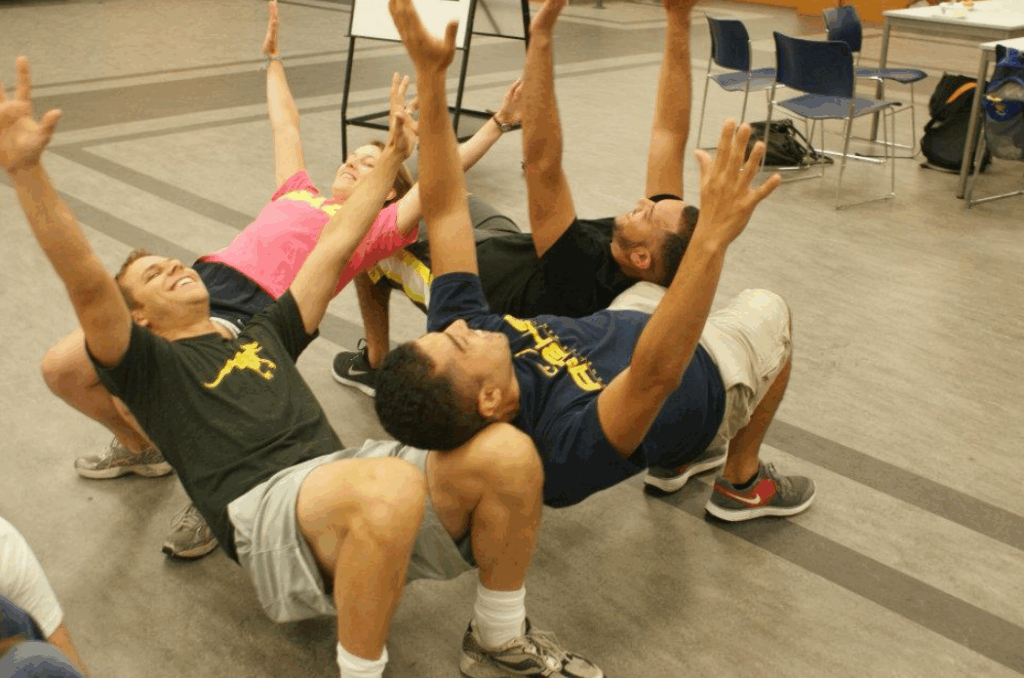Trust falls that really build confidence, communication obstacle courses that help players talk to each other better on the field, strength-based role reversal to help players understand each other’s problems, and shared goal-setting workshops to make sure everyone is on the same page. The five best team-building activities for athletes are problem-solving competitions that help them think more strategically.
You’ll get to know each other better, talk to each other better, and respect each other more, which will show in how you play on game day. Find out how these exercises can help your talented people work together to win championships.
Icebreaker and Communication Activities
Good communication is the key to working well with others. Icebreakers help players get to know each other, relax, and create a good atmosphere for working together. These drills also teach athletes how to listen carefully and speak clearly when things get tough.
Short communication drills like call-and-response name games, giving commands during warm-ups, and quick team introductions help people speak more clearly and on time. Coaches can also use structured partner tasks in which one athlete describes an action while the other does it. It helps improve the accuracy of verbal cues and the ability to listen.
These activities help players learn how to speak clearly, listen carefully, and get to know each other before moving on to more difficult drills.

Exercises to Build Trust
Trust is very important for success in sports, especially those that require synchronized movement, strategic passing, and shared responsibilities. Trust-building exercises teach athletes how to rely on their teammates and help each other when they are under stress, both physically and emotionally.
Players learn to trust their partners through traditional trust falls and blindfold navigation drills. Partner carries, guided movement tasks, and controlled resistance exercises help people trust each other and work together better.
These drills also promote accountability, respect, and connection, ensuring athletes understand that every team member plays a crucial role in achieving mutual goals.

Problem Solving and Strategy Drills
In team sports, you have to make decisions quickly and carry out your strategy as a group. Problem-solving games help people think together when they’re under pressure, which helps them stay calm and work together smartly.
To solve puzzles and get past obstacles, you need to plan and get input from others. Coaches can use game-specific strategy simulations in which players work together to figure out how to handle tactical situations, like where to stand on defense or how to run offensive plays.
These exercises help athletes become better at analyzing situations, being flexible, and valuing strategic communication and shared planning.

Relay and Coordination Challenges
Relays and coordination tasks help people get in better shape and build team spirit. These exercises stress timing, doing things right, and working together to reach a common goal.
Relay sprints, hand-off drills, and coordination circuits all show how important it is to keep a steady pace and make smooth transitions.
Passing sequences, synchronized footwork patterns, and group conditioning rounds help people work together and keep a steady beat. Such tasks enhance athletic coordination, reinforce trust in team mechanics, and instill discipline during high-intensity physical activities.
Competitive and Motivational Games
When handled properly, healthy competition helps athletes grow and boosts team spirit. Players are encouraged to push themselves in competitive group activities, but they should always put respect and unity among teammates first.
Athletes are encouraged to do their best while working together by doing team scrimmages, mini-tournaments, and point-based training exercises. Reward systems encourage good behavior and make people want to stick with it. These games keep athletes from getting too competitive by making them work together, so they stay in a supportive team mindset even when they’re training hard.
Sessions for Reflection and Feedback
Not all growth happens during physical drills. Athletes can use reflection and feedback sessions to look at their performance and find ways to get better. Open dialogue builds trust, encourages people to take responsibility, and helps people stay together for a long time.
Players can share their thoughts in a positive way through group debriefings, weekly team check-ins, and structured communication circles. Coaches can help athletes figure out what they’re good at, what they need to work on, and how to use what they’ve learned to make the group work better.
Regular reflection improves emotional intelligence and helps teams improve their communication skills so they can keep doing well.
Frequently Asked Questions
What are the best ways for athletes to build teams?
The best activities are those that focus on communication, trust, strategy development, physical synchronization, and structured reflection. A balanced approach is to combine physical drills with tasks that require communication and strategy.
How often should teams do activities that help them work together?
Adding team-building sessions once a week or every other week is good for teams. Adding shorter exercises to regular training also helps keep up with bonding and communication development.
Can activities that build teams help people do better on the field?
Yes. More trust, better communication, and better problem-solving all lead to more effective teamwork, faster coordination, and better performance in competitive play.
How do activities that build trust help people work together?
Trust exercises help athletes learn to depend on each other, which builds confidence in their group’s skills. It will be easier for the team to work together and be more unified during games.
How important is communication for athletes when it comes to building a team?
To run plays, coordinate movements, and stay calm under pressure, you need to be able to talk to each other. Team-building activities help people listen better, be clearer, and respond more quickly, all of which are important for success in sports.




